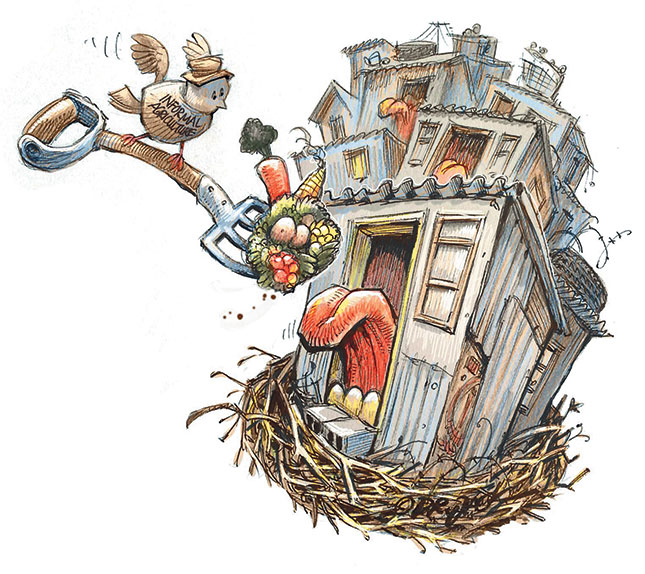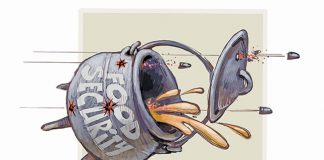
South Africa experiences high levels of food insecurity. According to the 2012 SA National Health and Nutrition Environment Survey, 28% of households were at risk of becoming food-insecure, while 26% were going hungry.
Increasing food prices suggest that urban food security is unlikely to improve in the foreseeable future, especially considering the impact of the recent drought.
But food security is not just about food availability; access is also important. The informal sector is vital in this regard, and often overlooked. Indeed, government lacks a clear and coherent policy in terms of the informal economy.
Furthermore, it is important to remember that the informal sector does not operate outside of the formal sector. It is a collection of many systems, and the informal and formal sectors are closely related, with mutual trade and exchanges occurring between them.
For example, research shows that informal traders source their products mainly from formal retailers such as Shoprite and Makro, amongst others. Moreover, many large firms engage the informal sector in formal business transactions where deliveries and collections are scheduled in accordance with pre-determined supply schedules.
This demonstrates robust and mutually beneficial linkages. With urbanisation increasing in South Africa, it is wrong to assume that the informal sector is used only by the ‘desperate’ as a temporary survival strategy until they can access the formal sector.
The informal sector is permanent for many new urbanites, and defines the landscape, politics and economy of contemporary African cities.
According to Statistics South Africa’s April-June 2016 Quarterly Labour Force Survey, 2 565 000 South Africans reported working in the informal sector. Although this figure is far lower than our developing country counterparts, it still comprises 16,4% of South Africa’s total employment.
Selling food
Existing evidence suggests that 72% to 82% of street traders sell food. One study, drawing on data from Kenya, Nigeria, Ghana, South Africa and other African countries, found that adults’ daily energy intake from street foods was 13% to 50%, while for children it was 13% to 40%.
Street foods, then, make a significant contribution to energy and protein intake in developing countries, and their use should be encouraged, provided that they are healthy, traditional foods.
An African Food Security Urban Network (AFSUN) survey found that some 70% of households normally source food from informal outlets, while 32% of households patronise the informal food economy almost every day. Fifty-nine percent said that they frequented informal outlets at least once a week.
The data also suggests that in the neighbourhoods and cities surveyed, the poorer and more food-insecure households are, the more likely they are to rely on the informal sector for food.This is due to several factors, including:
Accessibility: Street traders gravitate to areas where there is foot traffic, while spaza shops are often evenly distributed throughout townships and informal settlements. Proximity is important in areas where there is no or erratic electricity or no refrigeration, as fresh food must be bought daily.
A 2015 study of the Kanana informal settlement in Cape Town, for example, found that only 31% of residents had access to a refrigerator, 49% used cupboards and 15% used buckets to store food.
Low prices: A 2009 study compared the prices of 53 products (including fresh produce and fast foods) sold by informal traders in the Warwick Junction area in Durban to the equivalent sold at a range of formal retailers. On average, the cost in formal shops was 76% more than the same product sold by informal traders.
Supporters of supermarket expansion argue that their greater purchasing power and economies of scale will benefit the urban poor because of lower prices, but the evidence for this is quite mixed. Moreover, studies have found that where supermarkets in poorer communities offer cheaper average prices for staples, fresh fruit and vegetable choices are often limited, of poorer quality and more expensive.
Appropriate quantities: Informal retailers often sell products in smaller quantities that are more appropriate for those with low and erratic incomes and limited storage space.
Government policies
Existing SMME programmes have largely “been biased towards the groups of small- and medium-sized enterprises, and, to a large extent, have by-passed micro-enterprises and the informal economy”.
This is according to the authors of ‘The impact of the South African government’s small, medium and micro enterprises (SMME) programmes: A ten year review’ (Rogerson, CM. 2004. Development Southern Africa. 21[5]: 765-84).
In addition, ‘Budgets and the informal economy’ found that although some government departments had made progress towards recognising the informal economy, support measures were “few and far between, patchy and incoherent, and largely ineffective”.
The National Development Plan (NDP)gives particular primacy to small businesses, projecting that the informal sector will create 1,2 million to two million jobs by 2030. But the NDP says little or nothing about how existing informal sector operators will be supported, or how existing barriers to entry will be eliminated to generate new jobs.
Specific proposals to create a more enabling environment are relevant mainly for formal sector small and medium enterprises.
Even the National Informal Business Upliftment Strategy (NIBUS), launched by the Department of Trade and Industry (DTI) in mid-March 2014, is worrying. Although the ‘business upliftment’ component targets entrepreneurial activity in the informal economy, the emphasis on ‘graduation’ to the formal economy misses the point.
It overlooks the importance of and need for the informal sector, and runs the risk of ‘picking winners’ and neglecting the majority.
Another problem is the anti-migrant disposition, identifying a ‘foreign trader challenge’. This is clearly evidenced by the comment made by Deputy Trade and Industry Minister, Elizabeth Thabethe, in the City Press in 2013 that “you still find many spaza shops with African names, but when you go in to buy, you find your Mohammeds and most of them are not even registered”.
This anti-foreign sentiment reinforces a generally punitive approach to the informal sector, which focuses on regulation and control.
The November 2015 report of the parliamentary committee that investigated the xenophobic attacks of 2015, which targeted immigrants working informally, recommended the regulation of township businesses.
The report states, for example, that municipal governments must improve systems for providing and monitoring business permits, noting a “tendency of issuing too many licences” to businesses operating out of residential dwellings, many of which do not comply with municipal by-laws.
This approach is likely to be negative for South African and immigrant informal operators alike.
Consequences
In short, an analysis of the national, regional and local policy environment for informal operators in South Africa shows that it is, at best, benignly neglectful, and at worst, actively destructive. But the informal economy is one of the main means by which the poor attain a measure of food security.
If policy approaches do not formally recognise the importance of the informal sector, the negative consequences will not only result in shrinking employment and a greater reliance on a resource-poor state, but growing food insecurity and the placing of extra burdens on the state and society.













